
Some stories start with a bang. This one starts with a Lyft ride.
The mountainous, frozen landscape of Park City, Utah during the Sundance Film Festival doesn’t lend itself toward long walks. With us snug in the warm backseat of our Lyft ride, our driver asks about the films we’ve seen. We mention we’re on the way to interview the directors of Mucho Mucho Amor, a new documentary about genderqueer Latino psychic, Walter Mercado. The film comes to Netflix July 8.
Walter Mercado?! The driver practically bellowed the words. Our driver mentioned that he grew up in Venezuela, where Mercado had scores of fans.
At his peak, the ever-flamboyant Mercado had tens of millions of followers, as he appeared on a series of radio and television shows, authored books and published columns in newspapers and magazines. His product: spiritual advice, and a message of enduring love and inclusion.
How about we take this to the next level?
Our newsletter is like a refreshing cocktail (or mocktail) of LGBTQ+ entertainment and pop culture, served up with a side of eye-candy.
That message stayed with Cristina Costantini and Kareem Tabsch, the co-directors of Mucho Mucho Amor. The pair sought out Mercado, who had long since retired, as the subject of their collaboration. Filmed just prior to his death in late 2019, the new documentary allowed Mercado–though plagued by failing health–to recount his life and career, and even enjoy one last blaze of fame.
One Lyft ride–with one very excited Lyft driver–later, we arrived at Netflix’s Sundance offices to chat with Costantini and Tabsch about all things Walter Mercado. Mucho Mucho Amor arrives on Netflix July 8.
So both of you, it’s clear from the film, grew up watching Walter. What was your earliest exposure to him?
KT: Gosh, I really can’t remember a time when Walter was not on television. He’s been such a part of culture for so long.
CC: He’s an extended member of the family for every Latino home. He was there. Your mom was there. He was just there.
KT: He was on TV every day. Every day he was there on his show. He was in newspapers, on the radio. No matter where you turned he was present. So he was like a member of the family—the most fabulous member of the family.
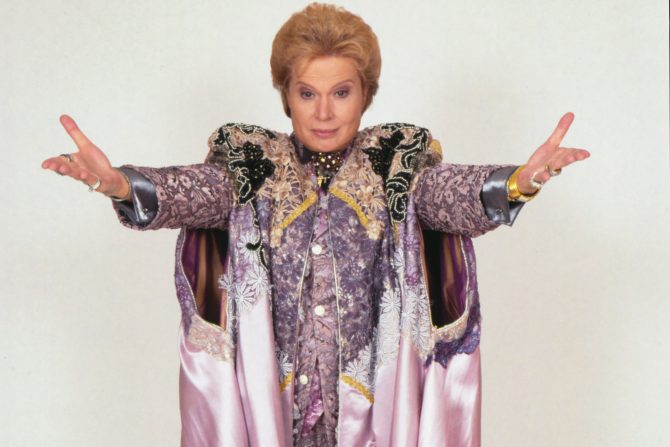
Given his style with capes, I have little doubt that is true for most families.
KT: 100%.
He strikes me as someone who needs an audience. He’s a performer. And he loved his audience. So how did you approach him? I know he was having health problems at that point…
CC: The very first problem we ran into was finding him. We—independently—were obsessed with Walter. And we independently wanted to make a Walter film. Walter was the one who brought us together. We hardly knew each other, and through the process of trying to find him, we found each other.
KT: Yeah.
CC: And over the course of one conversation the three of us decided we could work together. We all loved each other, we all respected one another’s work. So we were like let’s do it. And I had never met Kareem before.
Wow.
CC: We met the night before we met Walter.
KT: Yeah it’s crazy.
CC: So after we found him, we called him on the phone. And it was the strangest vetting process any of us had ever been through. [Walter]’s very first question to both of us was “I’m interested in doing this, but what are your signs?”
[Laughter]
We’re both Libras. Water’s a Sagittarius, so apparently that was the right answer, because here we are. And he was happy with that. He was very eager to be back in the spotlight. You can see it in the preparation for the Miami event. The cameras filled him with energy, with life.
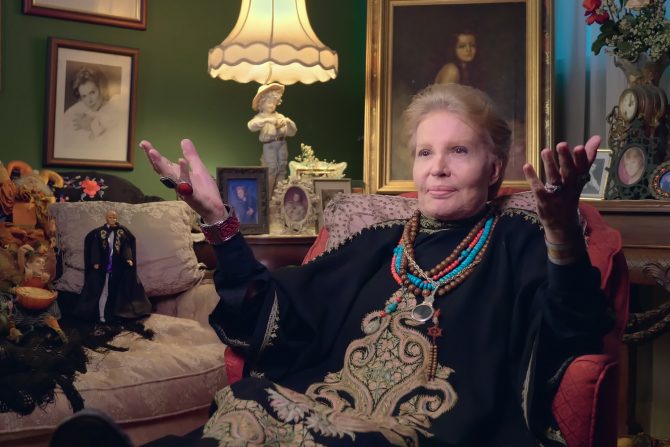
Yes.
CC: Even when we were recording him in bed [due to health issues], just having the camera there when he could barely move, he was concerned with how he looked. [She lapses into a Walter impersonation] “You have to check!”
[Laughter]
That was his life’s work: appearing in front of an audience.
KT: And he knew that. He knew he was meant to be in front of a camera.
CC: Yeah.
KT: There’s no doubt, even when you see him in young pictures, he knew he had something he wanted to share. And share he did.
Well and the kind of performer we’re talking about in this context—someone on the radio, and TV, and in the papers, and in magazines every day—it’s so rare to find someone like that now. I’m trying to even think who an American analogue would be to that…Alex Trebek? Ellen?
CC: Oprah.
Oprah for sure. Do these people sleep? How do they find time for all this?
CC: He was just everywhere.
KT: And at the pique of his fame, he was in 120 million homes per day.
My lord!
CC: It’s incredible. It’s like the Super Bowl.
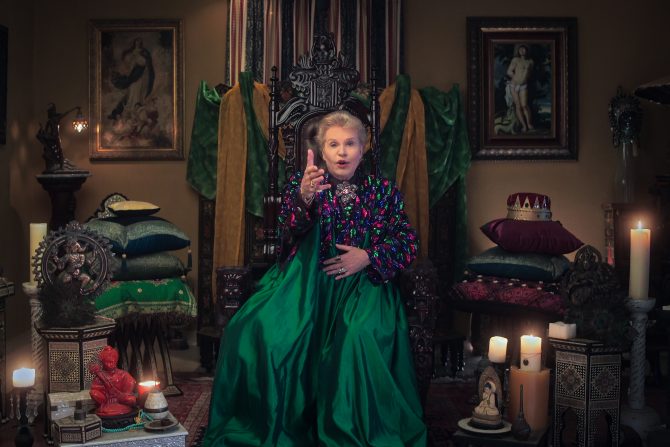
And we should mention these were in different countries too. It’s amazing the reach the man had.
CC: And it’s interesting because it’s not just the people you would think would be his fans. He’s not just grandmas and gay men. There were really—like, bros, grandpas, uncles—and Walter opened this weird place for himself. Very few others in Latino culture have been able to do that. And he was loved by many many people.
That’s wonderful.
CC: Though we should also point out, he was also othered. It’s very complicated, and at times, very problematic. But that’s also why we find him so fascinating. He’s loved by everyone.
KT: And he never shied from being himself. There wasn’t a demurring here. Walter came on television like this is what it is. And he was always like that. Demure from Walter was just like one sequin!
[Laughter]
But for us, he was so unabashedly himself at every turn. And for years on Latino television, it was all soccer and soap operas.
CC: Women in bikinis.
KT: It was a very formulaic thing. Then here comes Walter: this fabulous, over the top, larger than life person living their truth without asking for permission. It was such an unlikely thing for him to rise to these levels.
Well, let’s talk about him living that truth for a moment. In the modern lexicon, we might call Walter genderqueer or non-binary. And he even says in the film “Sometimes I’m a man, sometimes I’m a woman.” Is that right?
CC: He came before a time where there was a conversation about pronouns. So his pronoun was always “he.” But I think Walter doesn’t identify one way or another. He likes being both genders. I think for him it’s a form of inclusivity.
Interesting.
CC: He is of every religion. He practices every faith. He wants to be above divisions. He’s all about love and inclusion. I think being both genders is part of that for him.
Related: The LGBTQ figures we lost in 2019
KT: He talks a lot about it in the film: blending the energies, and about the fact that he 30 years ago was talking about it. He would talk about a future where we were not identified by gender or by race. And this is in Latin America. So he always had that sense that the strict binaries we’re shoved into are ridiculous.
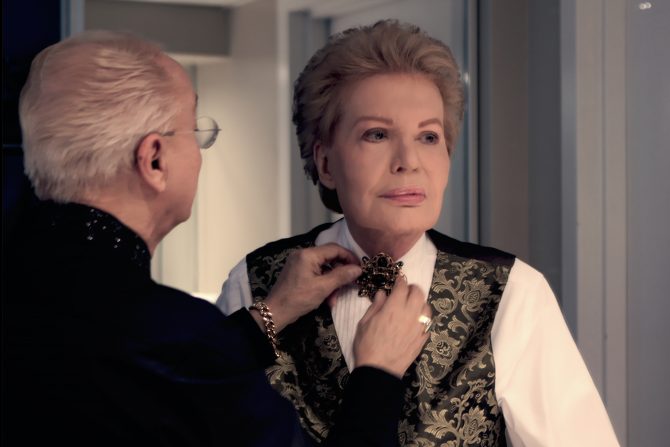
CC: Right.
KT: Be who you are and embrace it all.
That also brings us to the subject of his sexuality. Though I’m guessing neither of you had sex with him…
KT: We did anything to make him happy. Anything to make the movie!
[Laughter]
Good to know. But someone in the film refers to him as being asexual. Did he give you any indication?
KT: He never said he really fell in love. We did ask him. He didn’t say he had a love of his life or anything like that. You know, he came from another era where you didn’t talk about romantic liaisons. He was very good looking as a young man.
CC: A galan. A leading man.
I love that.
CC: He would sometimes call our cameramen galanes. “Who are all these handsome galanes you’ve brought to my house?” He was very flirtatious with everyone.
KT: Very flirtatious. Male, female, everyone. We think, being an attractive man, sure, there had to have been somebody. He used to always say “If somebody has slept with me, let them tell it to the press. Talk about it.” And he said this for years, and nobody ever stepped up to say he had an affair with Walter Mercado. So he didn’t talk about it. He was of a different generation where you didn’t talk about that regardless of sexuality or identity. You didn’t flaunt that.
CC: It was one of those very hard things about the film. He was intent on not sharing any of this information, on taking it to the grave. And he did.
One of the other major figures in the film is Bill Bakula, his longtime manager whom Walter later sued over misappropriation of finances. But they worked together a very long time; it was only in the last few years of their relationship that things went sour. Was Bill reluctant to talk about all this?
CC: Our producer Alex Fumero spoke with Bill a lot before the interview. I think Bill felt that it was better for him to give his side of the story. He knew we were going to ask him about it. And the truth is, they both loved each other very much. Even to the end, Walter had love for everybody. He still had love for Bill and still said beautiful things about each other.
KT: They still had mutual respect for one another even after all the craziness.
CC: They built something beautiful together, but it fell apart. But they still have nostalgia for when times were good.

So for the two of you as directors, when you’re interviewing someone like that that maybe has a shady past, how hard do you press him to talk about the things he did wrong? How hard do you push when he denies something, and you have documentation to prove otherwise? Do you call him out?
KT: Well, Christina has a background as an investigative journalist covering drug lords and sex trafficking. So as a journalist, she’s run into a lot of difficult people of suspect origins.
CC: Small potatoes [compared to Walter].
KT: She did almost the entirety of those interviews by herself, and I think she knows how to talk to people.
CC: Yeah. I think you have to be honest with people and press them on the way that they’re being perceived by their critics. If you’re going to show them in one light, you need to give them the opportunity to answer the question. I think people respect that.
KT: And to his credit, Bill answered every question we asked. There was nothing where he said “No comment.” He shared his truth.
One question I have coming out of the film and learning about the Bill-Walter lawsuits: Walter only discovered the misappropriation when the money stopped coming in, and when Bill didn’t have any either. Where was the money going?
KT: That’s a great question for Bill.
CC: Yeah.
KT: It’s not something we necessarily know. It was something that kept coming up in those court cases about the business not being run correctly. But we don’t know.
You guys didn’t even meet until the night before you met Walter. Then you agree to make a film together. When you go in blind like that, how do you find a working dynamic between the two of you? What happens in moments of disagreement?
CC: Well we both co-directed before. I think that makes it easier.
KT: For sure.
CC: We’re used to a partnership. So we naturally fall into the mode of what do you think? And it’s great. I love having conversations. Everything in filmmaking is a choice. Being able to make those choices with someone else who has a brilliant mind makes the job easier.
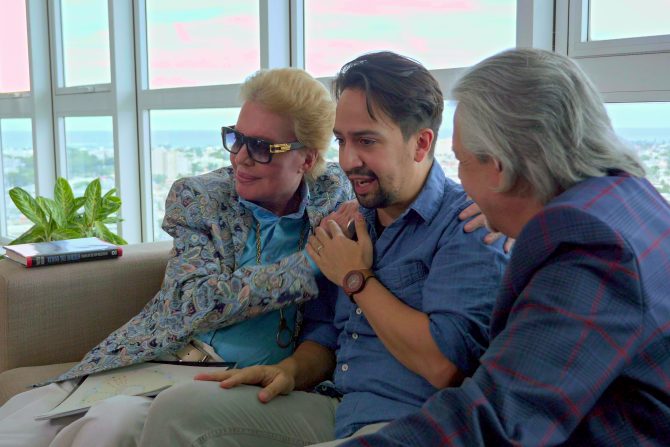
KT: Yeah.
CC: And the product is better when you have people with very different viewpoints coming at it. We both have different experiences and expertise. I shoot verite, but I have no idea how to do archival. Kareem has taught me so much about how to integrate archival [footage]. There was so much I didn’t know that I didn’t know.
KT: It’s interesting. This kind of collaboration—our previous experiences co-directing were with people whom we had long-term relationships with. But we met the day before we met Walter. We met two days before the cameras started rolling. So in this process, we got to know each other as filmmakers and as people.
CC: We’ve become friends.
KT: We have become friends. And sure we disagreed. We drove each other crazy at times, but I think that’s actually a strength. When you don’t have someone saying “I think you’re wrong,” you live in an echo chamber. I think that’s why I love working with a co-director, and someone who is an amazing journalist. So much of the infancy of the film is moments getting behind moments of the unforeseen and just pressing through. So our skillset complemented each other, and we filled in the gaps. It’s such an intimate process.
Yes it is.
KT: But we both had this love for Walter, but from different viewpoints. Myself, as a young queer person grew up loving him, and Christina as a Latina in the Midwest, growing up in Milwaukee and seeing what he meant to us. So that melange we threw into the pot worked really well together.
On the subject of skepticism, did Walter did readings for you? How did they pan out? Did you get a sense of his overall accuracy?
CC: Well, as you see in the film, he predicted Sinbad would become the greatest comic of the Millennium. And he has not.
KT: Well he’s still technically alive, so that may yet pan out.
[Laughter]
CC: Sure, Walter got things wrong.
Is he a charlatan?
CC: In my opinion, I think Walter made a lot of people feel really good. He preached love and inclusion. In the same sense that maybe the Catholic church is charlatans or any religious figure is a charlatan. But in my opinion, anyone preaching love, respect, peace is doing good for this world. And if there are flare and mysticism on top of it, that’s ok.
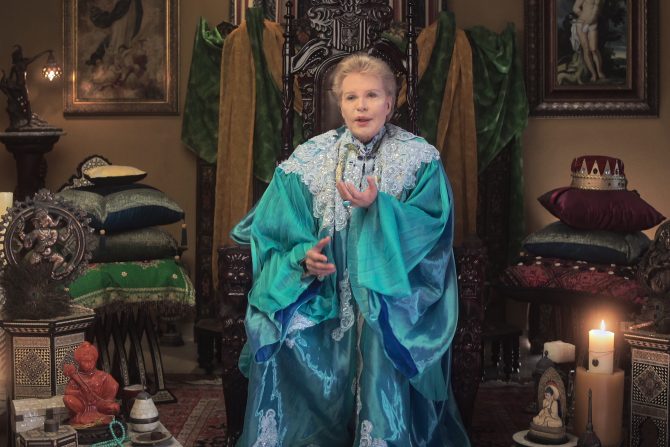
KT: Walter made mistakes for sure. He did things he regretted, things that were questionable. But he made people happy. I think he was cognizant of that. He was selling hope. He was serving it up daily. Walter was a great motivational speaker, and his audience needed that. These were people—a great deal of the audience were immigrants in the United States, many in areas where there were not strong Latino communities. Many had low paying jobs and experienced incredible racism. But they could turn on the TV and someone would say tomorrow would be a better day. That’s powerful.
CC: And to treat people with kindness.
KT: Yeah. So I don’t think he’s a charlatan at all. That was his job, and he did it like nobody else I’ve ever seen. And he’s a queer icon, and an enduring one.
True. We don’t venerate Miss Cleo that way.
KT: That’s right.
CC: You can’t overstate the impact he had. I don’t think Miss Cleo had that.
Mucho Mucho Amor arrives on Netflix July 8.























Kangol2
I’m looking forward to this documentary about this legend. There will never be another Walter Mercado!
Prax07
Legend? Never heard of him before Snatch Game on Drag Race last week.
Kangol2
He had and has millions of fans. If you never watch Spanish-speaking media in the US or from across Latin America, which has hundreds of millions of Spanish speakers (463 million as a primary language), that might explain your cluelessness about him.
Doug
What a great interview! I saw the film on Netflix yesterday and was very moved by it. Walter Mercado was an amazing man.
ShiningSex
I wish he would have “come out”. Everyone knew. I mean come on. He was loved regardless.
ShiningSex
Walter never came out of the closet, but is obvious that he was gay. Everyone in the Latino community knew it but didn’t care like Juan Gabriel. We all knew.
Doug
His identity was very much like Liberace’s. I think people knew in an almost subliminal way, they just didn’t want to look at it. I felt sad watching the film that he hadn’t found someone to love him by the time he died. If the documentary is correct, he was a great guy with a very big heart.